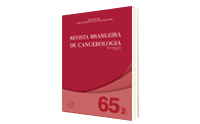Influence of Chemotherapy Treatment on Eating Behavior and Quality of Life of Oncologic Patients
DOI:
https://doi.org/10.32635/2176-9745.RBC.2019v65n2.93Keywords:
Neoplasms/drug therapy, Feeding Behavior/drug effects, Quality of LifeAbstract
Introduction: Cancer is a multifactorial disease with uncontrolled cells growth, whose treatment can trigger food aversions and changes in quality of life. Objective: To evaluate the influence of chemotherapy treatment on eating behavior and quality of life of oncologic patients. Method: A longitudinal and observational study, carried out from June to October of 2018, at the University Hospital of the Federal University of Piauí. The data were obtained in two moments: T0, socioeconomic, demographic, clinical, food behavior and quality of life, and T1, food behavior and quality of life. The following tests were used: Shapiro-Wilk, t-Student and Wilcoxon; Pearson and Spearman, with p <0.05. Results: Of the 17 patients, the majority were females (82.4%), medium age of 54.2 years, family income of 1 to 2 minimum wages (64.7%) and ethnics, brown (76.5%). Breast cancer was the most frequent (52.9%). There were food aversions in T1, for “soups and pastas” (p=0.001), “meats and fish” (p=0.016), and “sweets, desserts and appetizers (p=0.001). There was a significant difference in quality of life regarding the general health status (p=0.001) and financial difficulty (p=0.026), as well as in correlations between quality of life and food behavior. Conclusion: The results reinforce the need of constant nutritional monitoring since the beginning of the chemotherapy in order to avoid and/or reduce the negative repercussions on the nutritional status and, consequently, on the quality of life. In addition, more studies with longer time ranges and larger samples are required.









